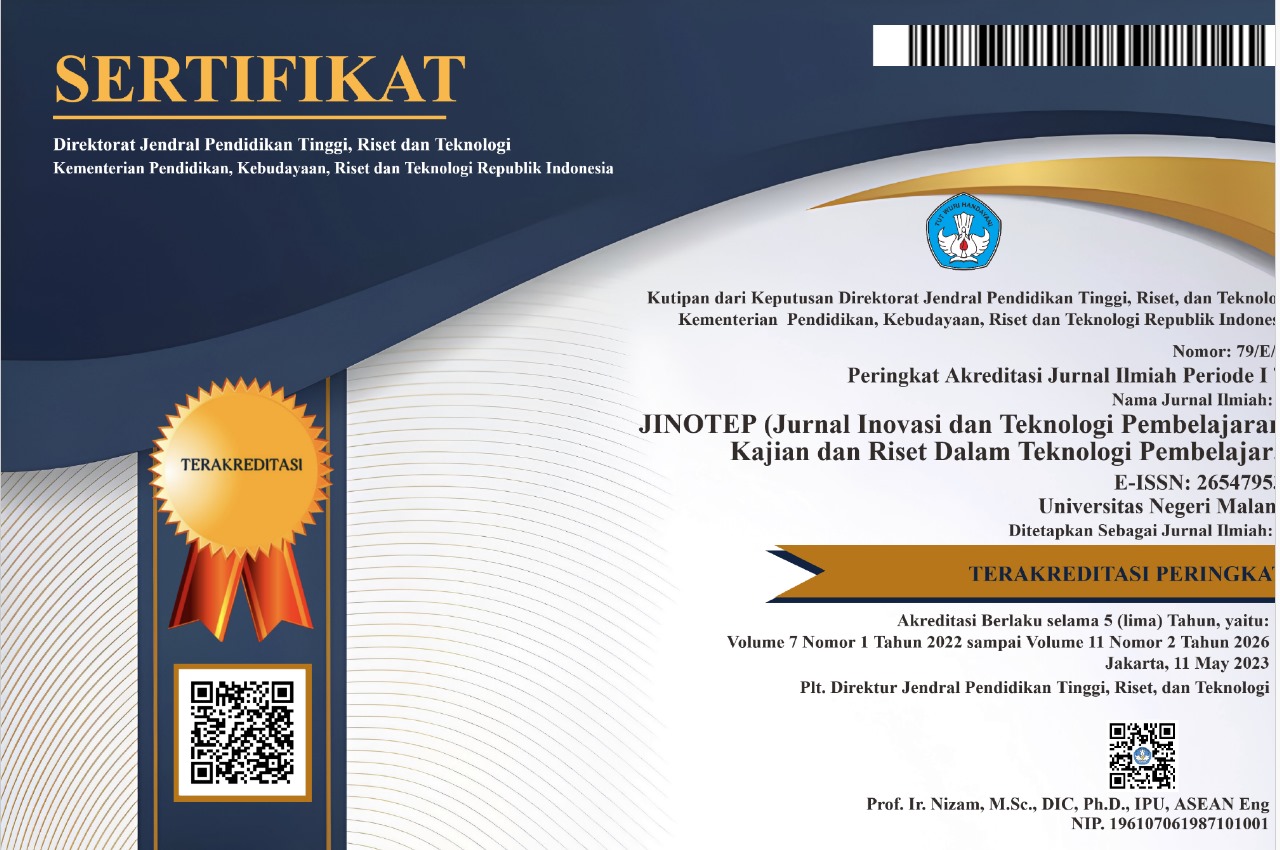Hubungan Self Control dengan Internet Addiction Disorders dan Kecemasan Siswa dalam Menghadapi Ujian
Abstract
Abstrak: Self control pada siswa mempengaruhi siswa dalam mencapai tujuan pembelajaran, salah satunya dalam mengatasi masalah yang saat ini sering terjadi, yaitu Internet Addiction Disorders, tetapi tidak terdapat hubungan signifikan dalam kecemasan siswa ketika sedang menghadapi ujian. Tujuan pada penelitian ini untuk mengetahui apakah adanya hubungan antara self control dengan Internet Addiction Disorders dan kecemasan siswa dalam menghadapi ujian. Terdapat hubungan antara self control dengan Internet Addiction Disorders pada responden. Terbukti dengan adanya nilai sig. F uji korelasi yang bernilai 0,00 lebih kecil dari nilai 0,05.Dan tidak terdapat hubungan antara self control dengan kecemasan siswa saat menghadapi ujian pada responden. Terbukti dengan adanya nilai sig. F uji korelasi yang bernilai 0,163 yang lebih besar dari nilai 0,05. Yang artinya dalam penelitian ini antara self control dengan kecemasan siswa dalam menghadapi ujian tidak terdapat hubungan yang signifikan.
Abstract: Self control in students affects students in achieving learning goals, one of which is in overcoming problems that currently often occur, namely Internet Addiction Disorders, but there is no significant relationship in student anxiety when facing exams. The purpose of this study is to determine whether there is a relationship between self-control with Internet Addiction Disorders and student anxiety in facing exams. There is a relationship between self control and Internet Addiction Disorders in respondents. Proven by the value of sig. The F correlation test with a value of 0.00 is smaller than the value of 0.05. And there is no relationship between self control and student anxiety when facing exams on respondents. Proven by the value of sig. F correlation test with a value of 0.163 which is greater than the value of 0.05. Which means that in this study, there is no significant relationship between self-control and student anxiety in facing exams.
Keywords
Full Text:
PDFReferences
Aviyah, E., & Farid, M. (2014). Religiusitas, kontrol diri dan kenakalan remaja. Persona: Jurnal Psikologi Indonesia, 3(02).
Babakr, Z. H., Majeed, K., Mohamedamin, P., & Kakamad, K. (2019). Internet Addiction in Kurdistan University Students: Prevalence and Association with Self-Control. European Journal of Educational Research, 8(3), 867–873.
Basri, A. S. H. (2014). Kecenderungan Internet Addiction Disorder Mahasiswa Fakultas Dakwah Dan Komunikasi Ditinjau Dari Religiositas. Jurnal Dakwah, 15(2), 407–432.
Beard, C. L., Haas, A. L., Wickham, R. E., & Stavropoulos, V. (2017). Age of initiation and internet gaming disorder: The role of self-esteem. Cyberpsychology, Behavior, and Social Networking, 20(6), 397–401.
Chen, R., Cui, W., Lei, H., & Liu, Y. (2012). The relationship of self-control and aggressive behavior in College students. Chinese Journal of Behavioral Medicine and Brain Science, 21(8), 751–753.
Chita, R. C. M., David, L., & Pali, C. (2015). Hubungan antara self-control dengan perilaku konsumtif online shopping produk fashion pada mahasiswa Fakultas Kedokteran Universitas Sam Ratulangi angkatan 2011. EBiomedik, 3(1).
Ekasari, A., & Yuliyana, S. (2012). Kontrol diri dan dukungan teman sebaya dengan coping stress pada remaja. SOUL: Jurnal Pemikiran Dan Penelitian Psikologi, 5(2), 55–66.
Faried, L., & Nashori, F. (2013). Hubungan Antara Kontrol Diri Dan Kecemasan Menghadapi Masa Pembebasan Pada Narapidana Di Lembaga Pemasyarakatan Wirogunan Yogyakarta. Khazanah: Jurnal Mahasiswa, 5(2), 63–74.
Frangos, C. C., Frangos, C. C., & Sotiropoulos, I. (2012). A meta-analysis of the reliabilty of Young‘s Internet Addiction Test. Proceedings of the World Congress on Engineering, 1, 368–371.
Hay, C. (2001). Parenting, self‐control, and delinquency: A test of self‐control theory. Criminology, 39(3), 707–736.
Ismail, A. B., & Zawahreh, N. (2017). Self-control and its relationship with the internet addiction among a sample of Najran university students. Journal of Education and Human Development, 6(2), 168–174.
Larasati, M. A. (2014). Hubungan antara kontrol diri dengan pembelian impulsif pakaian pada mahasiswi psikologi Universitas Negeri Surabaya yang melakukan pembelian secara online. Character: Jurnal Penelitian Psikologi., 2(3).
Lestari, S. B. (2015). Shopping Online Sebagai Gaya Hidup. Jurnal Ilmu Sosial, 14(2), 24–41.
Mallorqui-Bague, N., Fernandez-Aranda, F., Lozano-Madrid, M., Granero, R., Mestre-Bach, G., Bano, M., … Menchon, J. M. (2017). Internet gaming disorder and online gambling disorder: Clinical and personality correlates. Journal of Behavioral Addictions, 6(4), 669–677.
Mukhlis, H., & Koentjoro, K. (2015). Pelatihan kebersyukuran untuk menurunkan kecemasan menghadapi ujian nasional pada siswa SMA. Gadjah Mada Journal of Professional Psychology (GamaJPP), 1(3), 203–215.
Muna, R. F., & Astuti, T. P. (2014). Hubungan antara kontrol diri dengan kecenderungan kecanduan media sosial pada remaja akhir. Empati, 3(4), 481–491.
Mutohharoh, A., & Kusumaputri, E. S. (2013). Teknik pengelolaan diri perilakuan dalam menurunkan kecanduan internet pada mahasiswa Yogyakarta. JIP (Jurnal Intervensi Psikologi), 5(2), 252–274.
Nevid, J. S., Rathus, S. A., & Greene, B. (2005). Psikologi abnormal. Jakarta: Erlangga, 96–101.
Ningtyas, S. D. Y. (2012). Hubungan antara self control dengan internet addiction pada mahasiswa. Educational Psychology Journal, 1(1).
Pakpahan, R. (2015). Ujian Sekolah sebagai Upaya Pemetaan Mutu Sekolah Dasar. Jurnal Pendidikan Dan Kebudayaan, 121790.
Pearce, J. (2000). Perilaku yang buruk. Penerjemah Purnama Sidhi. Jakarta: Bina Rupa Aksara.
Pezoa-Jares, R. E., Espinoza-Luna, I. L., & Vasquez-Medina, J. A. (2012). Internet addiction: A review. J. Addict. Res. Ther. S, 6(2).
Praherdhiono, H., Setyosari, P., Degeng, I. N. S., Slamet, T. I., Surahman, E., Adi, E. P., … Abidin, Z. (2019). Teori dan Implementasi Teknologi Pendidikan: Era Belajar Abad 21 dan Revolusi Industri 4.0. Seribu Bintang.
Rachbini, W., & Hatta, I. H. (2018). E-Lifestyle And Internet Advertising Avoidance. Jurnal Manajemen, 22(3), 435–448.
Riduwan, A., & Akdon, A. (2007). Rumus dan data dalam analisis statistika. Bandung: Alfabeta.
Said, I. (2017). Warung kopi dan gaya hidup modern. Jurnal Al-Khitabah, 3(3).
Sari, A. W., Mudjiran, M., & Alizamar, A. (2017). Tingkat kecemasan siswa dalam menghadapi ujian sekolah ditinjau dari jenis kelamin, jurusan dan daerah asal serta implikasi. Bikotetik (Bimbingan Dan Konseling: Teori Dan Praktik), 1(2), 37–42.
Soetjipto, H. P. (2005). Pengujian validitas konstruk kriteria kecanduan internet. Jurnal Psikologi, 32(2), 74–91.
Surahman, Ence; Soepriyanto, Yerry; Sulthoni; Setyosari, P. (2019). Model Peer Collaborative Authentic Assessment (PECOLASE). Indonesia: 000139977.
Surahman,Ence., Kuswandi, Dedi., Wedi, Agus., Degeng, I Nyoman Sudana., Septianti, D. A. (2019). Adaptive Learning Analytics Management System (Alams): An Innovative Online Learning Approach. International Journal of Innovation, Creativity and Change, 5(4), 413–430.
Surahman, E., Satrio, A., & Sofyan, H. (2020). Kajian Teori Dalam Penelitian. Jurnal Kajian Teknologi Pendidikan, 3(1), 49–58.
Surahman, E., & Surjono, H. D. (2017). Pengembangan adaptive mobile learning pada mata pelajaran biologi SMA sebagai upaya mendukung proses blended learning. Jurnal Inovasi Teknologi Pendidikan, 4(1), 26–37. https://doi.org/10.21831/jitp.v4i1.9723
Thalib, S. B. (2017). Psikologi pendidikan berbasis analisis empiris aplikatif. Prenada Media.
Tsai, H. F., Cheng, S. H., Yeh, T. L., Shih, C.-C., Chen, K. C., Yang, Y. C., & Yang, Y. K. (2009). The risk factors of Internet addiction—a survey of university freshmen. Psychiatry Research, 167(3), 294–299.
Turner, N. E., Robinson, J., Harrigan, K., Ferentzy, P., & Jindani, F. (2018). A pilot evaluation of a tutorial to teach clients and clinicians about gambling game design. International Journal of Mental Health and Addiction, 16(1), 136–149.
Vyjayanthi, S., Makharam, S., Afraz, M., & Gajrekar, S. (2014). Gender differences in the prevalence and features of internet addiction among Indian college students. Media Innovatica, 3(2), 47–51.
Webb, C. A., Olson, E. A., Killgore, W. D. S., Pizzagalli, D. A., Rauch, S. L., & Rosso, I. M. (2018). Rostral anterior cingulate cortex morphology predicts treatment response to internet-based cognitive behavioral therapy for depression. Biological Psychiatry: Cognitive Neuroscience and Neuroimaging, 3(3), 255–262.
Welsh, D. T., Mai, K. M., Ellis, A. P. J., & Christian, M. S. (2018). Overcoming the effects of sleep deprivation on unethical behavior: An extension of integrated self-control theory. Journal of Experimental Social Psychology, 76, 142–154.
DOI: http://dx.doi.org/10.17977/um031v8i22021p122
Refbacks
- There are currently no refbacks.
Copyright (c) 2021 Faris Ardiansyah, I Nyoman Sudana Degeng, Arafah Husna

This work is licensed under a Creative Commons Attribution-ShareAlike 4.0 International License.
======================================================================
Jurnal Inovasi dan Teknologi Pembelajaran published by Universitas Negeri Malang in collaboration with the Asosiasi Program Studi Teknologi Pendidikan Indonesia (APS TPI) and Ikatan Profesi Teknologi Pendidikan Indonesia (IPTPI) with a MoU.
Publisher Address:
Educational Technology Laboratorium, Building D5, 1st Floor
Faculty of Education, Universitas Negeri Malang
Semarang St. No. 5, Malang City, East Java Province, Postal Code 65145
Email: jinotep.fip@um.ac.id
======================================================================

JINOTEP is licensed under a Creative Commons Attribution-ShareAlike 4.0 International License.
JINOTEP Statistics (Since July 13th, 2020)



.png)




.png)
1.png)
1.png)
4.png)
2.png)
1.png)
1.png)
.png)


_3.png)





1.png)
.png)